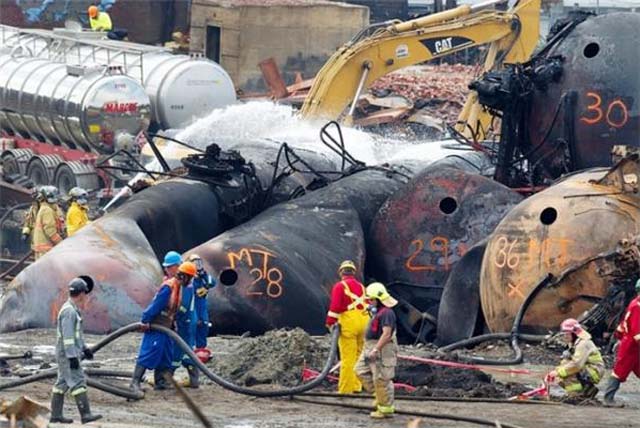Firefighters hose down a rail car with foam as crews remove a toppled rail car in Lake Megantic - 19 Jul 2013 Allen McInnis. 17 January 2014 Who Pays for Lake Megantic Cleanup? Lake Megantic Quebec - The dispute over who will foot the bill for the estimated $200-million cleanup and decontamination in Lake Megantic moves into a courtroom next week, with a hearing on legal orders issued by Quebec's environment minister last summer.
In the weeks after an oil train derailed and killed 47 people in Lake Megantic, Yves-Francois Blanchet ordered Montreal Maine and Atlantic Canada, Montreal Maine & Atlantic Railway (MMA), Canadian Pacific, and three American oil-services companies to clean up spilled oil and any other contaminants.
They also had to prevent their spread into the environment, evaluate the extent of the environmental contamination, devise a cleanup and decontamination plan, and then execute that plan.
Nearly 6 million litres of oil is estimated to have spilled or burned in a fire following the train crash.
Oil contaminated downtown Lake Megantic, the nearby lake, and Chaudiere River.
The six companies have all contested the orders, which were issued under Quebec's environmental-quality law.
The orders came after workers on the site briefly stopped working 17 Jul 2013 because they said MMA was not paying them.
The town of Lake Megantic told the companies it would pay them to ensure the work continued.
In the month after the derailment, Lake Megantic had paid nearly $8 million to emergency workers.
Blanchet has said Quebec taxpayers would not foot the cost of the cleanup bill.
All of the companies asked Quebec's environment department to modify or quash the orders, but the government rejected those requests in October, according to documents filed with the Tribunal administratif du Quebec (TAQ).
A three-judge panel of the TAQ is to begin holding hearings on the contestation of the orders on Thursday.
In documents filed with the TAQ and reviewed by The Gazette Friday, MMA argued the environmental orders should be overturned because the company was already doing the work required by the environment minister.
MMA said a dispute with its insurance company led to the work stoppage on 17 Jul 2013, but that work resumed the following day, and it continued the work until Quebec took control of operations in Lake Megantic in mid-August.
MMA said it was put in "an impossible situation" because its insurer was in discussions with the Quebec government to use MMA's insurance policy to compensate people who suffered damages from the derailment and not for the ongoing cleanup and decontamination work.
In their motions to have the orders quashed or amended, the other four companies, CP and three U.S. oil-services companies, pointed fingers at each other over who owned or was responsible for the oil on the train when it derailed.
The oil-services companies, World Fuel Services Inc., World Fuel Services Corp., and Western Petroleum Co., want the TAQ to remove them from the environmental orders.
They said the orders should not apply to them because they are American companies with no operations in Quebec, and Quebec has no jurisdiction outside the province.
They said neither World Petroleum Co. nor World Fuel Services Corp. ever owned the crude oil involved in the derailment.
World Petroleum Co. leased the tanker cars and its name appeared on shipping documents, but did not own the oil, the companies said.
As for World Fuel Services Corp., its only involvement was that it was to receive the bill for transportation costs, the companies said in documents filed with the TAQ.
Before the derailment, World Fuel Services Inc. owned the crude oil, but had sold it to Irving Oil and it was to be delivered to Irving's refinery in Saint John, N.B., according to the companies' TAQ documents.
If the order is upheld and they are considered to be owners of the oil, which they deny, the three companies said that CP and MMA should be held responsible for "a substantial part" if not all of the environmental-remediation costs because CP had custody of the oil and MMA was responsible for the oil spilling.
For its part, CP said MMA was in charge of the oil at the time of the derailment.
CP said it did not own the locomotives or the tanker cars on the derailed train, nor the tracks the train was travelling on.
CP said its responsibility was to transport the oil from North Dakota to its train yards in Cote St. Luc, which is where MMA took possession of the train and the oil.
CP argued that Quebec was trying to hold it financially responsible for actions that it was clearly not responsible for.
It has asked the TAQ to declare the entire legal order CP is named in null and void because the environment department took more than 30 days to provide it with files related to the order.
All of the companies argued that Quebec had incorrectly used the province's environmental-quality law to issue the orders, which are only supposed to be used in an emergency situation.
They said that by the time the orders were issued, one on 29 Jul 2013, the second on 14 Aug 2013, there was no longer an emergency in Lake Megantic because cleanup and decontamination work was already underway.
On Thursday the TAQ is scheduled to hear a request from the town of Lake Megantic to be granted intervenor status in the case.
According to the Quebec orders, World Fuel Services Inc., World Fuel Services Corp., and Western Petroleum were the owners of the oil that spilled in the 6 Jul 2013 derailment.
World Fuel Services Inc. bought the oil from different suppliers in North Dakota, Western Petroleum Co. rented the tanker cars used to carry the oil, while World Fuel Services Corp. was identified as the party to be billed for the transportation of the oil, the order said.
The crude oil was destined for an Irving Oil refinery in Saint John, N.B., but the company is not named in the environmental orders.
In the 14 Aug 2013 legal order, Quebec says Irving did not own the oil because it was never delivered to the company's refinery in Saint John.
MMA filed for bankruptcy protection in Canada and the U.S. in August, and is for sale.
Friday was the deadline for submitting bids in the sale of the company.
BY THE NUMBERS
47 - The number of people killed in the Lake Megantic train derailment.
5.98 million - The estimated number of litres of oil that spilled in the wake of the accident.
$200 million - The estimated cost of cleanup operations in Lake Megantic.
$15.7 million - The opening bid in MMA's bankruptcy sale.
At least 125,000 - The approximate number of carloads of crude oil that Canadian Pacific and Canadian National transported in 2013.
In 2009, 500 carloads of crude oil were moved by Canadian railways. Monique Beaudin. | 

